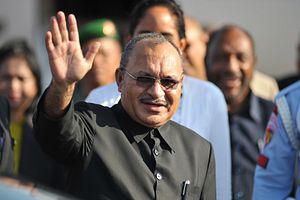In yet another dramatic turn of events playing out within the high theater that is Papua New Guinea politics, Prime Minister Peter O’Neill resoundingly defeated a vote of no confidence in Parliament today by a vote of 85-21 out of the country’s 111 MPs, with five declining to vote.
Tensions have been running high in PNG since the June 8 shooting of protesting students at the University of Papua New Guinea, which injured 17 people and saw ten students hospitalized. Unrest at PNG’s universities has been continuing for around five weeks as student activists called for the resignation of O’Neill, with one student killed at the University of Technology in Lae. The chancellor of UPNG has announced that the academic year would be abandoned until 2017.
Doctors, aviation workers, lawyers, union members, and port workers mounted a coalition in calling for O’Neill to resign, threatening strikes and obstructions to the delivery of essential services. The government has threatened to draw upon its own emergency powers to counter a potential national strike.
The impassioned opposition speeches in Parliament today all centered upon the question of O’Neill’s integrity and fitness for office. The drama dates back to an alleged improper payment of AU$30 million authorized by O’Neill to the PNG law firm Paraka Lawyers, which resulted in a warrant being issued for the prime minister’s arrest by his own anti-corruption body, Taskforce Sweep. Since that time O’Neill has continually obfuscated attempts to execute the warrant, including shuffling his allies into the positions of attorney general and police commissioner, attempting to arrest the head of the National Fraud and Anti-Corruption Directorate, and engaging in a range of Supreme Court shenanigans.
Today was the first day that Parliament has reconvened since the shooting, which many saw as a potential tipping point in O’Neill’s long-running battle to outrun the rule of law. A vote of no confidence had originally been tabled for June 8 but was delayed when Parliament was adjourned following the shooting. When the Supreme Court ruled that Parliament must reconvene in one week to hear the vote of no confidence, the government faction set off for a bizarre week of Hawaiian shirts and negotiations at a “political camp” in Alotau in the Milne Bay province, presumably in order to isolate the MPs from potential backroom deals that might sway their loyalty away from O’Neill.
Though a number of government MPs were reportedly considering defecting during the week, it appears that the promises made by the O’Neill faction have won out. Whilst the corruption scandal looms large above O’Neill, he is still popular at a national level, and his term has more or less delivered a badly needed period of stability for a country that has historically seen a high turnover of leaders. O’Neill has skilfully presided over a highly varied and fluid coalition, and has been forthcoming in offering Cabinet positions to placate potential opponents.
The outcome of the vote is imbued with even more disappointment for the opposition by the fact that PNG is heading towards elections in June 2017. The question as to who controls the purse strings in the lead up is of crucial importance in an electoral process that has been characterized by widespread vote-buying ever since limited preferential voting was introduced in 2002. PNG elections are highly expensive to run, with expenditure of US$63 per person in 2012, reportedly the highest in the world. Re-election considerations also likely played a key role in the outcome of today’s vote, since moving into the opposition faction generally means that MPs find it harder to access the government-controlled District Service Improvement Funds. These funds enable MPs to engage in discretionary spending projects and thereby win favor in their constituencies. The government’s ability to control how the funds are meted out — and to delay them indefinitely in the case of their political opponents — will be a strong determinant of which MPs will see re-election in 2017.
The police presence has been intense surrounding the capital today, with large queues of people waiting outside the gates of Parliament since 6 am to hear the outcome of the vote. Levels of unrest and violence in city centers like Port Moresby and Lae will likely spike in response to the dramatic political news, but it is unclear as to whether the coalition of service workers will proceed with a national strike now that the vote has been cast so strongly in O’Neill’s favor. For citizens who are dissatisfied with O’Neill’s leadership, the focus will now be directed toward the 2017 elections, in which government MPs will see whether their gamble to support O’Neill will pay off. For the moment, O’Neill has bought himself more time.
Sally Andrews is a New Colombo Plan Scholar and the 2015-2016 New Colombo Plan Indonesia Fellow. She is a Director of the West Papuan Development Company and the 2016 Indo-Pacific Fellow for Young Australians in International Affairs.

































